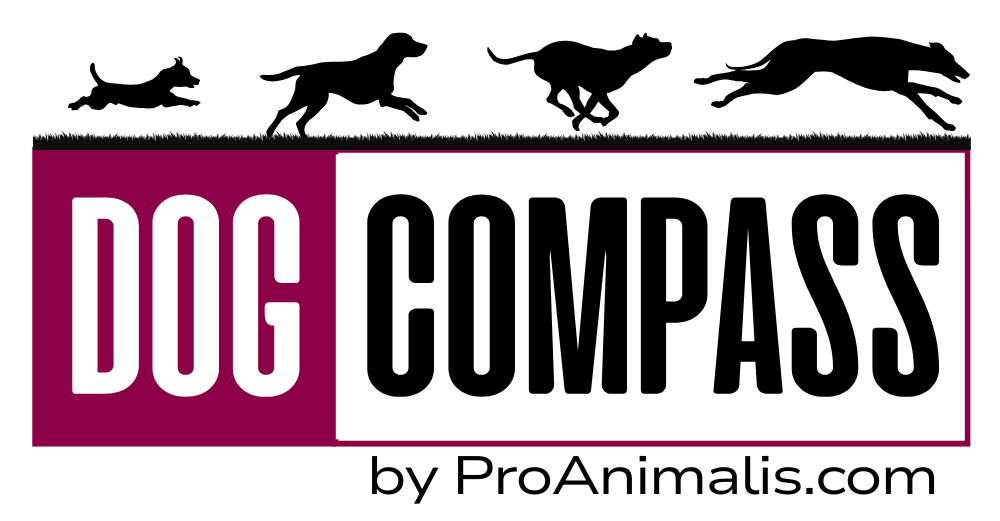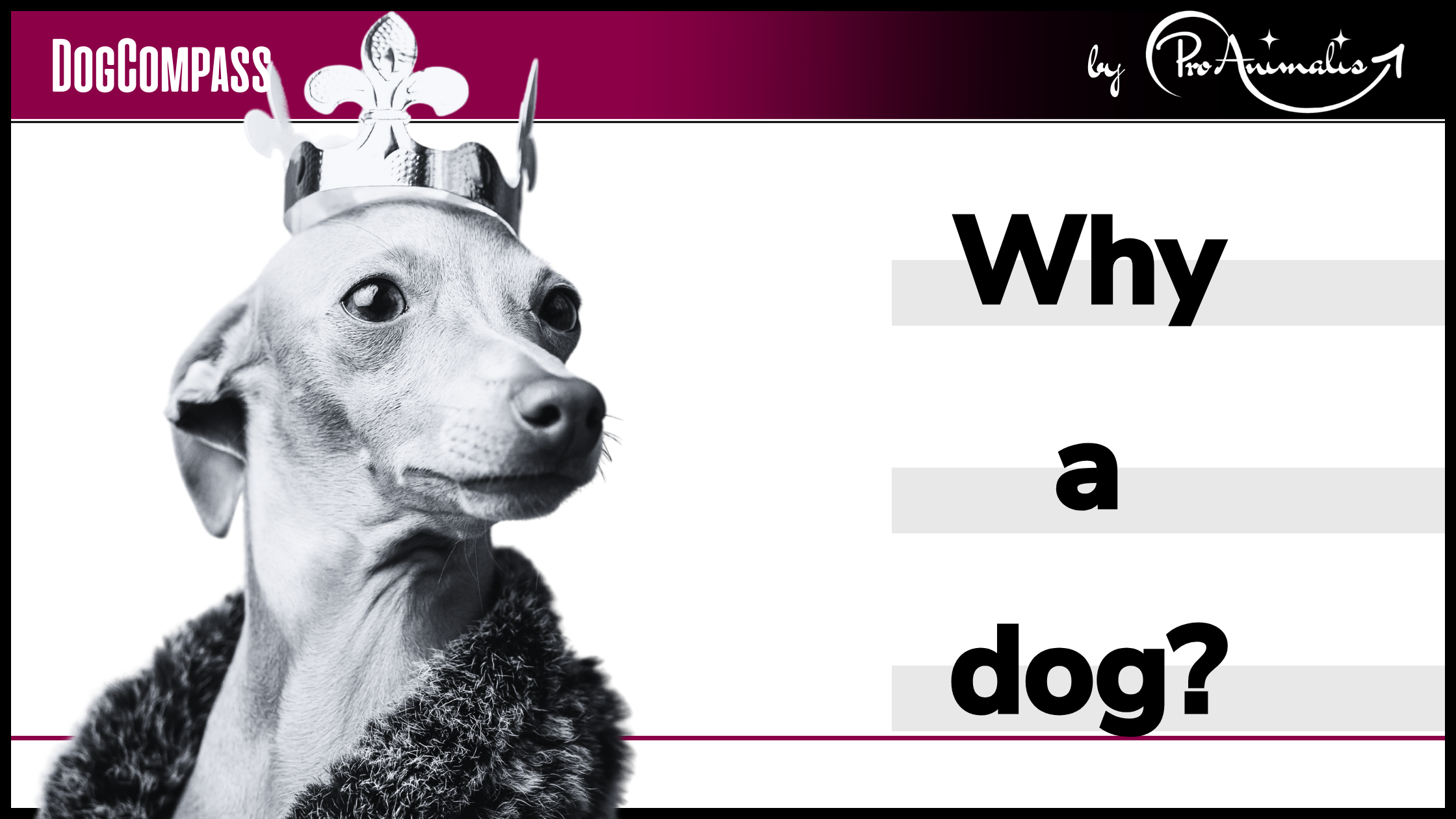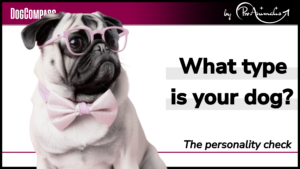So why a dog anyway?
Have you ever asked yourself that too?
What brings you to the dog?
Why not a donkey?
A guinea pig?
A horse?
Or even a cow? Why not?
There are as many answers to this question as there are personality types.
After all, there are not only happy dog owners in the world, but also people who are super happy with their donkeys, guinea pigs, horses, cats, rabbits, reptiles or other crawling animals.
So what motivates us dog owners to choose this type of animal in particular?
- The animal species that likes to wallow in the mud – apparently only to rub its wet fur dry on the sofa or even in the freshly made bed.
- The type of animal that exudes a scent in the heated living room on wet winter days that makes you run away.
- The animal species that, regardless of age, size and breed, often comes with an enormous potential for surprises in terms of behavioral problems, insubordination and sharp teeth.
Or why did it ever occur to us to take responsibility for one of these animal candidates anyway?
After all, this responsibility always means in each of these cases:
- costs – not to be underestimated,
- an enormous amount of time and energy,
- daily restrictions in our personal freedom,
- thoughtfulness,
- organization,
- grief and sorrow
- and so much more
Every pet owner, whether dog, horse, cat, rodent or reptile is familiar with these supposed disadvantages.
So what exactly does the company of a dog give us that justify these limitations in our lives and even make them desirable?
We’re going to get to the bottom of this question here!
I mean deep.
Really deep.
Obvious reasons for keeping a dog
Of course, we will start with the very obvious reasons here, such as:
- permanent company (especially for people who live alone)
- a reason to be in nature every day
- daily physical activities – the best health precaution
- to take on an important task and responsibility
- the children should learn and experience healthy handling of animals from an early age
- interest in dog sports, such as dog agility / -degility, jogging, hiking, dog dancing, dog training, etc.
- Social interests, such as dog sport clubs or groups, hiking together with other dog owners, daily meeting in the park, etc.
- your own dog as a guard dog
- an assistance dog is required, e.g. in the case of physical and / or mental limitations
This all makes sense, doesn’t it?
However, there are also a few reasons that are less obvious and that subconsciously influence our decision to let a dog into our lives.
I would like to elaborate on exactly these reasons here – because as subtle as they may be, they are extremely important factors for the coexistence of humans and dogs, which not least appeal to our psyche.
Subtle reasons for keeping dogs
The unconscious reasons that are buzzing around in the depths of our subconscious mind also make the decision to let a dog – often a very specific type of dog – into our lives, often much easier than expected – and for good reasons:
- Our hormones are freaking out
Our hormones do a dance of joy when we pet a dog.
Our body reacts immediately by releasing oxytocin, the bonding and feel-good hormone, which also lowers our blood pressure, cholesterol level and heart rate and reduces the production of cortisol, the stress hormone.
And our bodies do all of this simply because we pet a dog.
Isn’t that a super cool side effect?
- Emotional intelligence
Living with a dog demands and promotes your emotional intelligence.
Emotional intelligence is the ability to deal better with your own feelings and those of others. It is not just about recognizing these feelings, but also dealing with them appropriately – which is the difference between empathy and emotional intelligence. A dog will be an excellent coach for you along the way.
- Children and their immune systems
Children who grow up with a dog from an early age often have a strengthened immune system and are much less likely to develop animal hair allergies later in life than those who had no contact with animals at a young age.
In addition, children benefit from the emotional, social, and educational benefits of growing up with a family dog for a lifetime.
- Depression Killer
A large number of studies show that dog owners suffer from depression much less often than non-dog owners.
A dog is a great asset, especially for introverted people, and counteracts social isolation in many different ways.
- The parenting role
Due to our genetically anchored need to cherish, care for and educate, we often find ourselves in the dog owner role.
It is probably obvious that in this case I mainly address the female dog owners.
Biologically speaking, we women are born mothers: we are compassionate, forward-looking, understanding, responsible, fair, loving, non-resentful, and much more that makes a good mother.
And all of this was actually given to us free of charge from birth – wouldn’t it be a shame not to use these features anymore, as soon as the children are out of the house?
The relationship with a dog is actually very similar to the relationship between parents and children. The balance of power is unbalanced in both cases, so there is a giver and a recipient.
And if you are now thinking of the dog as a substitute for children … well … NO.
No dog can replace a child. And those dog owners who try, unfortunately fail miserably because of appropriate and adequate animal husbandry.
However, keeping a dog appeals to many characteristics that are also in demand by good and responsible parents. Therefore one can understand the connections between parent-child-relationships and human-dog-relationships also in scientific aspects.
But even in a less scientific way, it’s just nice to be needed.
- Connections across generations and status
Due to the common factor dog, the outer, more superficial values of the owners are reduced to almost zero.
When getting to know each other in the dog park, one does not address each other because of their external appearance, the same age or social status. Here the first look is always on the dog. This makes social contacts sooo much easier and more valuable and may increase self-esteem.
Older people in particular benefit from a sense of community across the generations.
- Wishful thinking and remembering old times
Do you remember … then …?
You were still young and fit, hungry for adventure, always on the go with friends, never alone and had big plans.
However, over the years this feeling of freedom often changes.
A dog will help you regain some of this freedom. Even if it is only through the introduction of healthy routines, such as getting up early and exercising a lot in nature.
- And last, but not least
… single people very much appreciate a constant, loyal companion, because beautiful moments, whether in nature, on vacation or simply during daily activities together, are simply more beautiful with a companion.
In my opinion, the benefits of taking a dog into the family are overwhelming.
But just because I’m focusing on the benefits in this article, you shouldn’t forget that everyday life with a dog can also have its pitfalls.
So, especially as a newcomer to the dog owner scene, do not make hasty decisions and be aware of your responsibility for another living being.
Comparison with other pets
From my own experience, I can say that personally stroking a horse makes me just as happy. However, the relationship with a horse, for example, is completely different for many reasons.
Every animal owner will of course find advantages in “his” o “her” animal species and every animal owner should also carefully clarify his or her priorities before he or she takes on years of responsibility.
As a constant, loyal and active companion, however, the dog is probably at the top of the list of pets in question. Because like no other pet, it is the only one who, if you let it, can be found by our side 24 hours a day.
Provided that you have chosen the right dog and meet its needs!
The right dog
Do you enjoy a active, sporty and adventurous life?
Then you probably don’t have 20 pairs of high heels in your closet, do you?
Neither should a person who prefers quiet walks in the park in front of their front door get a young, energetic and work-mad Border Collie.
Your dog’s temperament should suit you like your favorite pair of shoes.
The shelters are overflowing with suitable candidates for your lifestyle.
Do not let outward appearances such as coat color, size or breed tempt you to plunge yourself, your family and your future dog into the disaster of your own choosing.
So clarify your own priorities before attempting to turn a young, energetic dog into a couch potato.
From sad experience with two- and four-legged clients, I can confirm first-hand that an unsuitable choice can quickly turn your dream of living with a dog into a nightmare – and this of course also applies to the dog.
What if it's too late for the "right" dog?
This is where it finally gets exciting!
This is where you enter my world.
Because there are two factors behind a supposedly stupid decision to choose a supposedly stupid dog personality for your lifestyle.
1. You think the husky’s blue eyes are just great and you hope that with this dog on a leash everyone will be watching you.
Or the beautifully spotted fur of the Dalmatian fits perfectly with your taste in fashion.
In this case I cannot help you either and would advise you to look for a new owner for your dog as soon as possible, who can offer him a life that is appropriate and that meets his requirements.
Fortunately, these cases are extremely rare.
2. Your subconscious mind has tricked you into choosing this dog.
Are you an extremely soft-hearted, indulgent person and have you opted for the most headstrong, stubborn dog in the shelter?
Or have you become a bit sluggish in recent years and are slowly noticing the physical disadvantages of your way of life, even though you have otherwise preferred an active and adventurous life? And suddenly … you find yourself in the role of the owner of a young, fun-loving and happy to run – but frustrated – dog who, as compensation, makes use of your facility with sharp teeth, even though he would much rather walk next to you on his bike for hours?
I am convinced – and I can’t say it often enough – you’ll get the dog you need to grow on!
Your subconscious is doing a pretty good job in this case.
If it went like this for you, it is now up to you to ask the right questions. Do not start to turn your dog inside out, but take a deep and honest look in the mirror and ask yourself how you got into this situation.
If you’re lucky and able to deal with self-reflection, the question is answered quickly – but the transformation could possibly demand a lot from you.
Don’t worry, that’s exactly what people like me are for.
So if your dog somehow doesn’t really want to fit your lifestyle, or if he doesn’t do what you expect from him at all, then just get in touch with me – completely informal and non-binding. Often the path to an almost perfect and lasting harmonic human-dog relationship is more exciting and exciting than you might think.





